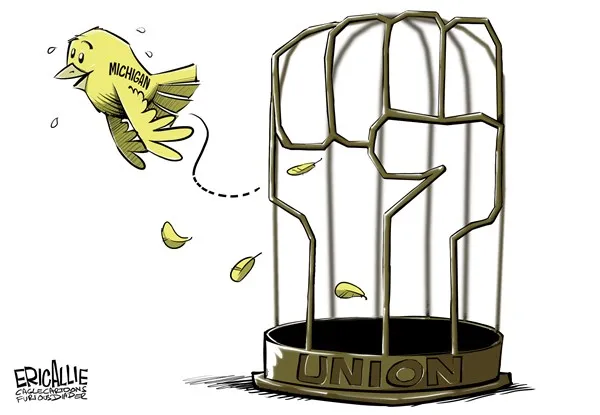Missouri Has Plenty of Good Reasons to Adopt a Right to Work Law

Local reps part of veto-proof congress

Just last month, Michigan became the 24th state to adopt a Right to Work law protecting employees from termination for refusal to pay dues or fees to an unwanted union. This enormous blow to Big Labor occurred just 10 months after Indiana had passed the 23rd state Right to Work law. Now Missouri is one of several states where Right to Work legislation could come up this year. Image: Eric Allie/PoliticalCartoons.com
A report posted December 31 on the web site of the Branson (Mo.) Tri-Lakes News includes some optimistic comments by state Rep. Lyle Rowland (R-Cedarcreek) regarding the prospects for enactment of a Right to Work law in the Show Me State this year. (See the link above for more information.)
Midwestern opponents of compulsory unionism certainly do have some cause to believe they have the wind at their backs. A year ago this month, just five of the 12 Midwestern states, Iowa, Kansas, Nebraska, North Dakota, and South Dakota, had Right to Work laws on the books. Subsequently, Indiana became the 23rd Right to Work state in February and Michigan became the 24th in December. And Missourians overwhelmingly support, as do other people throughout the Midwest and the U.S. as a whole, the principle that no one should be fired or denied a job for refusal to pay dues or fees to an unwanted union.
Nevertheless, it is a fact that passing a state Right to Work law has never been easy, and since the early 1950’s not a single statutory ban on forced union dues and fees has ever been enacted without years of careful preparation. The Big Labor bosses who benefit from wielding the power to get employees fired for refusal to fork over money to their organizations always fight with great zeal to retain their special privileges. And they have plenty of forced-dues money to throw around.
Typically, union propagandists waging anti-Right to Work campaigns expend relatively little time and effort trying to persuade the public that compulsory unionism is good in principle. The union hierarchy knows this is a losing battle. Instead, Big Labor seeks to frighten the public by feverishly predicting economic catastrophe if a state Right to Work law is enacted.
In reality, economic as well as moral considerations favor enactment of a Missouri Right to Work law.
The primary reason for passing such a law is to ensure that the individual employee’s freedom not to join a union receives just as much protection as his or her right to join. Currently, the right not to join a union is only nominally protected in Missouri and other forced-unionism states. Employees have a technical right not to join, but may be fired if as nonmembers they refuse to pay union “agency” fees that may be as high as full membership dues. This is not a genuine right not to join. Only Right to Work laws provide for that.
Economically speaking, Right to Work laws are strongly correlated with faster employment and compensation growth. Moreover, on average cost of living-adjusted disposable incomes per capita are higher in Right to Work states than in forced-unionism states. This is true within the Midwest as well as across the U.S.
For example, from 2001 to 2011, total private employment, as measured by the U.S. Bureau of Economic Analysis (BEA), in the five Midwestern states that had Right to Work laws on the books at the time grew by 6.8%, compared to Missouri’s private employment growth of just 1.7%. In Midwestern forced-unionism states as a group, private-sector jobs actually decreased by 0.4%.
Midwestern Right to Work states’ advantage in 2001-2011 private-sector employee compensation growth as measured by the BEA was even wider. Adjusted for inflation, private-sector compensation in Midwestern Right to Work states grew by 13.0% over the decade, compared to an increase of just 1.0% in Missouri and a decline of 2.7% in Midwestern forced-unionism states collectively.
Moreover, disposable income per capita (adjusted for interstate differences in cost of living with the help of indices calculated by the Missouri Economic Research and Information Center) was roughly $3400 higher in 2011 in Midwestern Right to Work states combined than in Missouri. Cost of living-adjusted disposable income per capita across all the Midwestern forced-unionism states was roughly $3100 lower than in Midwestern Right to Work states.
The fact that Right to Work status is correlated with a wide range of economic advantages does not, of course, prove irrefutably that Right to Work laws “cause” these advantages. This correlation does, however, tend strongly to discredit Big Labor’s far-fetched contentions about the supposedly horrific economic consequences of Right to Work laws.

